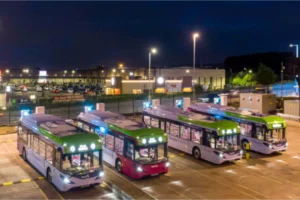The Laing O’Rourke and J.Murphy & Sons joint venture LM, has completed the installation of a 65-metre bridge over the M42, in just two days.
The 2,750 tonne bridge structure was carried along the motorway on a self-propelled modular transporter. The 448-wheel transporter took just one hour and 45 minutes to move the bridge span 150 metres into position, where it was affixed to a composite concrete deck to complete the overall bridge structure.
The new road bridge over the M42 was built using a Design for Manufacture and Assembly (DfMA) strategy.
The construction was carried out by engineering specialist Expanded, working on behalf of HS2 enabling works contractor, LM. The company led the construction programme on site, with 1,610 tonnes of precast and insitu concrete delivered, including 115 modular abutment shells and 298 precast deck components.
These major structural elements of the bridge supports and deck were made at Laing O’Rourke’s Centre for Modern Construction (formerly EIP) in Nottinghamshire, while Cleveland Bridge supplied 1,130 tonnes of steel plate girders.
The project forms part of the major remodelling of the regional road network to improve the circulation of traffic around the HS2 railway line and connect the existing road network to the new Interchange Station.
Mark Thurston, HS2 Ltd’s CEO said: “This new road bridge is the first permanent structure to be installed along the route of Britain’s new railway, so today represents an important milestone for the project and the West Midlands region. Constructing the bridge off site and using innovative engineering practices to install it over the motorway enabled us to carry out the work in just two days, keeping disruption to a minimum for road users”.
Simon Russell, LM project director, said: “This is British construction design and engineering innovation at its finest. Major components of the bridge and its supports were built offsite under safe, high quality conditions, then transported to site for assembly. Advanced digital capabilities allowed us to design all elements of the structure in a virtual world, before building it for real.”
Peter Lyons, Business Unit Leader, Expanded, said: “Offsite manufacturing and modular construction offer substantial benefits in terms of greater efficiency, higher quality, safety, and reduced time on site and disruption to local communities and road users.
“By delivering factory made components and assembling them on site, we have constructed abutment walls in 5 days, compared to between 8-12 weeks for traditional methods, achieved with a site team averaging just eight operatives.”





















